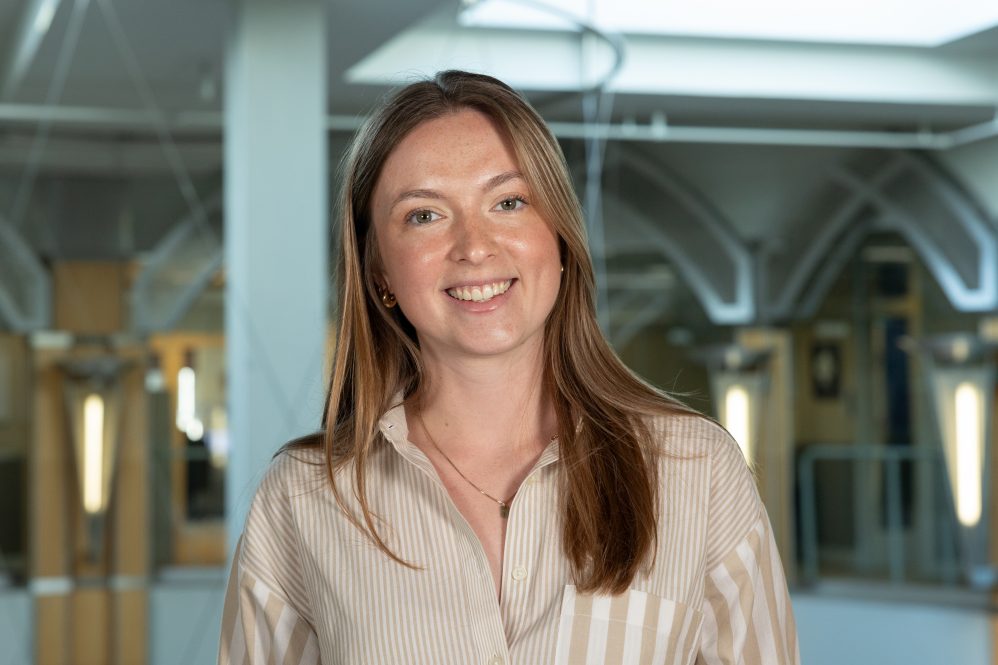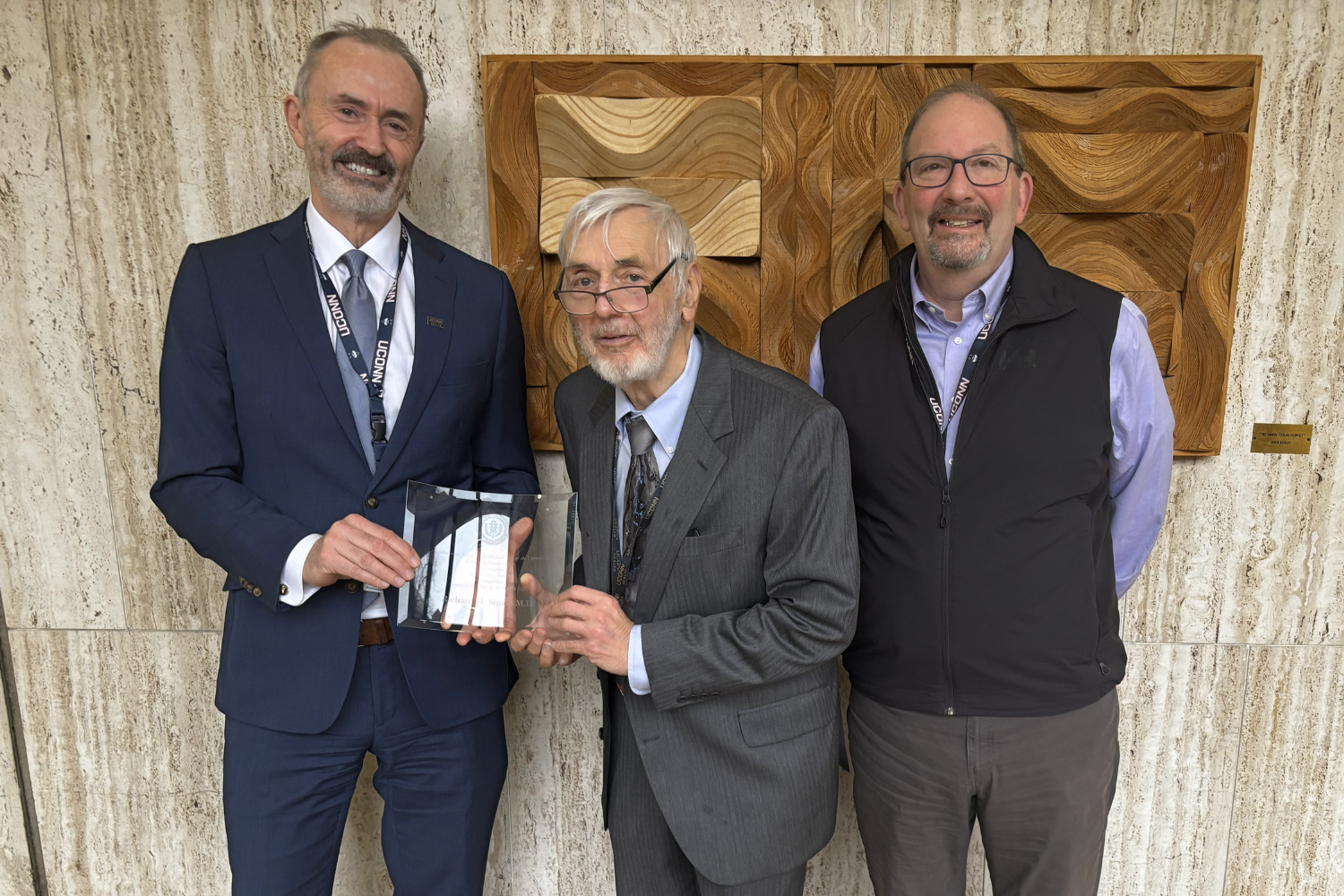While Katherine Bates, an economics major and statistics minor, always knew she liked working with numbers, she hadn’t set foot in the world of engineering innovation challenges until her first year at UConn.
“I never, ever saw myself in this space until I was pulled in,” says Bates, a fourth-year student from Collegeville, Penn., reflecting on her four-year involvement with the annual hackathon HackUConn.
The opportunity to help coordinate HackUConn arose naturally, thanks to connections she made in Greek life that first year as a member of Alpha Omicron Pi.
“A member from my organization connected me to the entrepreneurial ecosystem, because she thought I’d be a good student leader,” Bates recalls.
The on-campus hub of this entrepreneurial ecosystem is the Werth Institute for Innovation and Entrepreneurship, located in the Wilbur Cross Building. With Werth, Bates has helped coordinate the annual Experience Innovation Expo, an opportunity for UConn students to discover the wide range of programs, resources, and activities facilitating entrepreneurship, innovation, and creativity at the University.
HackUConn is also hosted through Werth, and it’s the buzziest event of the year for up-and-coming innovators at UConn. Over a sprint of 20 hours – from 5 p.m. to noon on the following day – student teams compete at Werth Tower to design innovative tech-enabled projects that respond to society’s most pressing challenges. They brainstorm, prototype, and pitch these projects to a panel of expert judges, and selected winners receive cash prizes in the form of scholarships.
And despite “Hack” being part of the event name, these solutions don’t need to be programming-related. Students from all disciplines are invited to apply their unique skill sets to this innovation-focused challenge. While “a computer programming background is definitely an advantage, it is not required to be a successful participant,” says Bates.
Some previous HackUConn winners have gone on to later pitch their hacked ideas to UConn’s Get Seeded, which gives students opportunities to earn seed funding and mentorship through the Connecticut Center for Entrepreneurship and Education, or CCEI, to help launch an entrepreneurial idea.
As the student organizing team lead, Bates’ involvement with HackUConn is a marathon, not a sprint – she works year-round to ensure the program goes off without a hitch.
“This is such a unique event because it’s entirely student-run,” says Bates, noting that the last two HackUConns she helped organize were the largest in UConn’s history.
HackUConn is also dependent on external funding sponsorships, which are all acquired via the student planning team. Past sponsors have ranged from UConn’s Office of the Vice President for Research to Haven Hot Chicken (which provided all-important rations to tide last year’s hackers over). Bates was able to apply her entrepreneurial and leadership skills to this task as a first-year student, before taking the role of student planning lead the following year.
“It was a fairly large learning curve for me, both getting to know UConn because it was my freshman year, and getting to know the language associated with hackathons,” she says. “But I think part of the reason why I’ve seen such success as a student leader in that the hackathon space is because I’m not a computer science major. I bring an alternative perspective into the space. My major in particular combines the math element with the human aspect.”
Now, Bates has assumed a mentorship role on the student planning team, helping the next generation of student leaders prepare to pilot the event to future success.
Outside the innovation and entrepreneurship sphere, UConn students may recognize Bates from another leadership role she holds: president of UConn’s Panhellenic Council. In this role, she is especially passionate about harm prevention, organizing against hazing and substance-related harm.
For other UConn students looking to follow in Bates’ footsteps, she offers this piece of advice: “Don’t turn down anything because of the title.”
“You learn some of your best lessons when you approach challenges you haven’t faced before; when you’re exposed to things you haven’t been exposed to before,” Bates says. “The whole entrepreneurial and hackathon ecosystem was never something I thought I’d be involved in, and it’s become something that has shaped me and given me the confidence to go out into the workforce, which has really been a value added to my college experience.”
At the same time, she cautions students against taking on too many responsibilities.
“I had to learn that the hard way,” she says.
Thanks to her leadership experiences, Bates has already lined up a job for after she graduates this spring: going full-time at the specialized consulting firm where she currently works part-time as a sales intern.
Eventually, Bates hopes to bring her skills (and “the interpersonal connection that I’ve grown to love over the past four years”) full-circle and help facilitate campus events from the corporate side.
“I’m hoping to go into early careers and talent development to tie back in the skills I’ve learned from HackUConn,” she says. “Those case competitions, hackathons, and other programs that big corporations often bring to universities — I’m hoping to get into the space where I can be the facilitator of those events.”
Follow UConn Research on X, LinkedIn, and Instagram.



